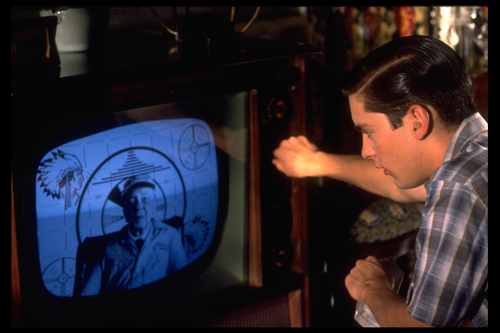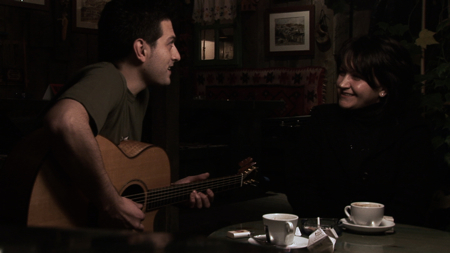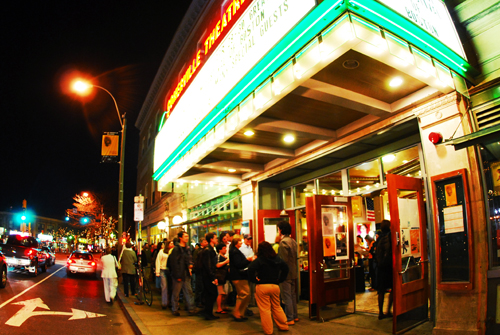
By David Ross. Avatar would seem to have no rivals in terms of asinine but aggressive cultural politics. It turns out to have a strong rival, Pleasantville (1998), the premise of which is that two modern kids (Tobey McGuire and Reese Witherspoon) get sucked into a 1950s TV show. They must save this world of family dinners and manicured lawns from its soullessness, mindlessness, and totalitarian conformity by literally teaching the locals how to have sex (in one icky scene, Reese gives her TV mother a lesson in the basics of masturbation). People awaken from their celibate comas and the world begins to shift from black and white to color, introducing a gratuitous racial allegory as the “coloreds” are harassed by the black and white remnant. Meanwhile, the pages of books, which were previously blank in token of the general emptiness of things, suddenly begin to fill with the words of D.H. Lawrence, J.D. Salinger, and other proto-liberationists. By the end of this magical process of transformation, the kids are humping like rabbits in the backseats of cars, the parents are headed for divorce, the citizenry is fighting in the streets, and the town is reduced to rubble – in short, thank god, the sixties have arrived, and not a moment too soon. Tobey returns to the present day to find that his dubious divorcee mother has broken up with her boyfriend. Tobey dries her eyes having learned the crucial lesson that life is “all about change,” never mind that it has led to the cultural wasteland depicted in the film’s opening scene, in which Tobey and Reese, nerd and slut, enact the clichés of the modern high school.
Baby Boomer propaganda has succeeded wonderfully, Pleasantville and Mad Men being cases in point. My students constantly parrot the assertion that the fifties were an era of conformity, conservatism, and materialism. I retort that the fifties were a golden age of American arts and culture, whose leading lights – Ray Charles, John Coltrane, Miles Davis, Hitchcock, Nabokov, Charles Mingus, Thelonious Monk, Flannery O’Connor, Eugene O’Neil, Jackson Pollock, Ayn Rand, Dr. Seuss, Muddy Waters, Billy Wilder, Tennessee Williams, Edmund Wilson – have no equivalent in later decades. I remind them, also, that the sixties did not even have the brains to invent themselves, but were invented in the pages of Allen Ginsberg and Jack Kerouac, whose masterpieces, “Howl” and On the Road, respectively appeared in 1956 and 1957. When you consider those who remained active – E.E. Cummings, Eliot, Faulkner, Frost, Hemingway, Henry Miller, Marianne Moore, Pound, William Carlos Williams – and those from elsewhere whose work was filtering into American culture – Bergman, Bresson, Camus, Fellini, Kurosawa, Picasso – the fifties become a crushing commentary on our own inadequacy.
Nabokov and Lionel Trilling here discuss Lolita on Canadian public television. Consider what this clip implies about the despised fifties: that a largish number of people not only gave a damn about a novel like Lolita (the third bestselling novel of 1958), but gave a damn what an academic Mandarin like Trilling had to say about it.

